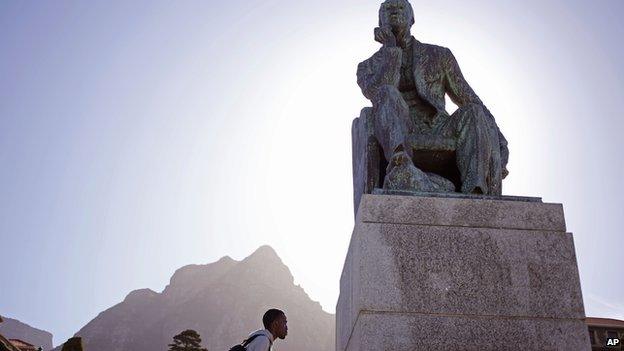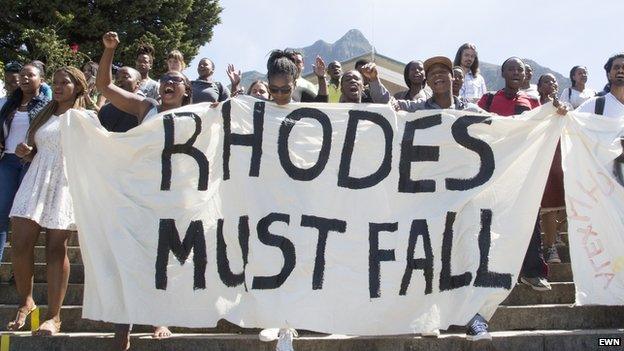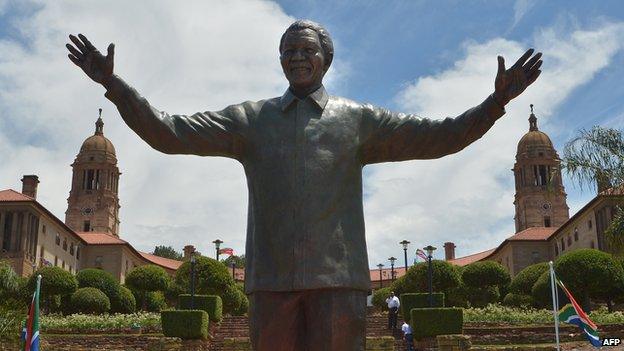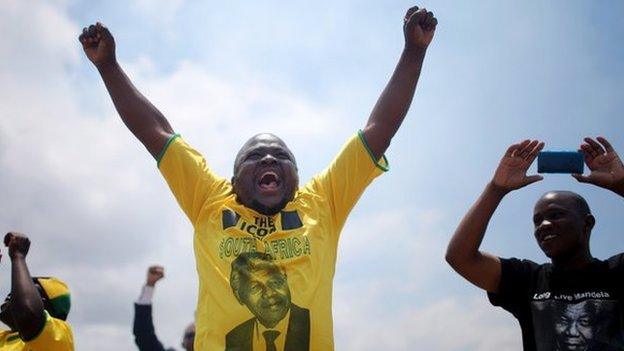Why South Africa should keep Rhodes statue
- Published

Some students at the University of Cape Town want a statue of Cecil Rhodes to be destroyed
The old symbols of white colonialism are still keeping the University of Cape Town (UCT) campus restless more than two decades after the end of apartheid.
The Student Representative Council (SRC) has been agitating about the statue of old colonialist Cecil John Rhodes.
It all began when student Chimane Maxwele tossed human excrement at the statue recently, demanding that it be taken down.
The statue of Rhodes is at a prominent position of the campus. It's on the upper campus, overlooking the university's rugby fields on Madiba Circle, previously known as Rugby Road. The statue depicting Rhodes in a seated position was unveiled in 1934.
Rhodes was an Oxford-educated politician and mining businessman, who played a key role in the expansion of British rule in southern Africa.
The university's campus is on a site bequeathed to the nation by Rhodes - who owned vast tracts of land - for a national university.
Eurocentric

Students has been protesting at the university for close to two weeks
SRC head Ramahiba Mahapha, 23, told me the statue was "a symbol of institutional racism".
Mr Mahapa, a fourth-year student of philosophy, continued "there are more substantive issues of transformation that we are fighting for".
"The statue is just a symbol. We need to have more black students and more black academics.

The protest has been supported by many
"The university is too Eurocentric. In a country where nearly 80% of the population is black, there are 1,500 academics at UCT and only 100 are black. That needs to change," the outspoken student leader said.
The university has said it recognises "divergent views" over the statue and that it is important to debate the matter.
UCT vice-chancellor Max Price told the Cape Times that talks about removing the statue from the university campus were at a "stalemate".
It is reported that while he was an active student in 1980s, Dr Price once called for the statue to be removed.
In an open letter this week Dr Price concluded: "I do not think the statue should be destroyed or hidden away. I just think it should not be there - it should be moved.
"This will not compromise our ability to record and debate the role Rhodes played in the city's and continent's history.
"And it will not change our acknowledgment that UCT acquired its site from the Rhodes estate, and the positive contribution that it has made to our institution and its students."
During demonstrations on campus, students were chanting "Rhodes must fall" and they carried a banner with the same message written on it.
What's in a name?
But not everyone holds the same view.
Trudi Makhaya, who studied as a Rhodes scholar at Oxford University, wrote in South Africa's Business Day newspaper that Rhodes was limited by the sexism and racism of his era but his scholarship endowments revealed a man who recognised some universal virtues.

What if a future government wanted to knock down statues of Nelson Mandela?
Ms Makhaya wrote: "These contradictions, Rhodes the pillager and Rhodes the benefactor, are a symbol of our country's evolution towards a yet to be attained just and inclusive order.
I agree with both the vice-chancellor and Mr Mahapa - the statue must not be destroyed but the university can do without a symbol of racism and colonialism in a post-Nelson Mandela era.
There was no love lost between the English- and Afrikaner-speaking peoples in the era leading up to the Anglo-Boer war of 1899-1902.
Rhodes wanted the British to control the Boer republics. But even when the Afrikaners came to dominate the country, they left his statue alone.
There are many symbols of white supremacy and colonialism in modern-day South Africa such as street names, the names of towns and even monuments which still evoke deep emotions among black people.
It would be a shame if this was the start of a historical tit-for-tat.
What if in another hundred years someone calls for Mandela's statue to be removed?
- Published1 May 2014

- Published29 August 2012

- Published9 July 2024
